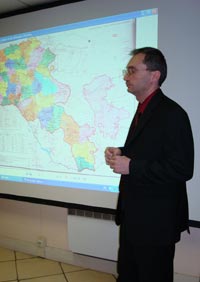Report on A. Ayvazyan’s Lecture Series in France – Part 2
 The Tchobanian Institute in partnership with the AGBU France had the insight and the good fortune to invite to France, for the first time, for a lecture series Armen Ayvazyan, PhD in political science, Director of the Ararat Center for Strategic Research.
The Tchobanian Institute in partnership with the AGBU France had the insight and the good fortune to invite to France, for the first time, for a lecture series Armen Ayvazyan, PhD in political science, Director of the Ararat Center for Strategic Research.
There was a lecture initially in Paris, April 4th, followed by a particularly interesting one in Marselles on April 8th. The lectures in Valence and Lyon were to be held on the 9th and 10th April respectively.
In front of a public of about 100 people gathered in the hall of the AGBU on the Boulevard Michelet, Michel Guéviguian, Vice President of the AGBU Marseilles, and Varoujan Sirapian, Founding President of the Tchobanian Institute, both underlined the enormous competence of the speaker as well as his independence from the governmental authorities and from all Armenian political parties. Varoujan Sirapian presented the latest issue of the “Europe & Orient” magazine, “Lies and Reasons of State”. Armen Ayvazyan regularly participates as a contributor to this geopolitical magazine published by the Tchobanian Institute. Professor Robert Der Mergerian rendered the translation throughout the evening.
Armen Ayvazyan, with the supporting evidence, explained the dangers that threaten the security of Armenia. He underlined the fact that Armenia inherited artificial borders, established to its detriment between 1920 and 1923 by the Soviets and by Ataturk. The Syunik region, which in certain sections is only 40 km wide, does not provide a sufficient strategic depth in case of Azerbaijani aggression. If Karabagh – that is adjacent to Syunik – had been lost in 1993, this would have meant the disappearance of the entire southern part of Armenia and eventually all of Armenia. In fact, with the loss of Syunik, the Ararat valley would no longer be a strategically and economically viable area and it would be surrounded on all sides by hostile states with Georgia being part of the American plan of confining Russia and Turkish plans of Pan-Turanism, the latter envisaging no less than the liquidation of Armenia. From that standpoint, it is essential that Djavakhk preserves and strengthens its Armenian population because there is a threat of its replacement by hostile Meskheti Turks.
To a question concerning the territorial concessions to obtain peace, Armen Ayvazyan replied that they are impossible without endangering the security of Armenia. He went further and criticized the policy of the Armenian government with respect to Turkey saying that it is counter-productive to propose a dialog without pre-conditions while that country insists on unacceptable conditions. Besides, according to Armen Ayvazyan, even a small piece of land has an enormous strategic and symbolic value. For example, giant Russia refuses to this day billions of dollars proposed by Japan for a part of the Kouriles islands.
On the ongoing negotiations, presided by the Minsk group, he does not envision any possible outcome, as long as the positions of both parties are so far apart: only the combination of relative military, diplomatic and economic power will decide the fate of Karabagh, with or without war.
A question addressed the impact of Karabagh on Armenia’s budget. On the economic scale, Karabagh and the liberated territories are rich: natural resources, fertile lands and water resources. They especially allow Armenia to attain the critical size from the standpoint of security and economic viability, with a global area of 42 000 square km. which is roughly equivalent of Switzerland or the Netherlands. It would be inappropriate to ask ourselves the question in terms of a budget. Strategically, Karabagh is a part of modern Armenia similar to Guimri, Vanadzor or other regions.
Inevitably, some questions addressed the current internal political situation. The case of Mr. Sefylian was mentioned. Armen Ayvazyan stated that it was incomprehensible that this person in charge of the non-govermental Committee for Defense of the liberated territories aligned himself with a politician, namely Levon Ter-Petrossian whose objective was precisely to return these territories to the Azeris.
He underlined the consequences of these recent events on the country’s security, since the Azerbaijanis have tested the capacity of Armenian resistance without hesitation on March 4 and lost 8 of their elite soldiers dead in a local assault that was accompanied by the use of heavy weapons, notably artillery.
The evening ended very late and all present expressed their wish to be able to hear Armen Ayvazyan again on other subjects that were addressed briefly during the evening such as the Armenian identity, the relations between Armenia and Turkey, etc.
Let us hope that the Tchobanian Institute organizes other lectures series in the months to come.
Read also in French: Tchobanian.org
CONFERENCE DEDICATED TO SECURITY PROBLEMS OF ARMENIA TAKES PLACE IN FRANCENoyan Tapan
April 10, 2008PARIS, APTIL 10, ARMENIANS TODAY – NOYAN TAPAN.
On April 4 the Tchobanian Institute, in partnership with the UGAB, organized the first of a series of conferences on “Armenia’s Security Predicament and the Ways Out of It”.
Doctor Armen Ayvazian, the Head of the Ararat strategic-scientific center, and Mr. Francois Thual, a prominent French geopolitologist and the Diplomatic Counselor to the Speaker of French Senate, took part in the conference as distinguished speakers. The next conferences that Dr. Ayvazyan and Mr. Varoujan Sirapian, the President-Founder
of the Tchobanian Institute will attend are scheduled in Marseilles on April 8, Valence April 9 and Lyon April 10.
Leave a Reply
Կայքի մոդերատորներն իրավունք ունեն հեռացնելու այն գրառումները, որոնք պարունակում են անձնական վիրավորանքներ, բռնության կոչեր, թեմայից դուրս գրառումներ, գովազդային նյութեր։ Նաև չի խրախուսվում շատախոսությունը (flood):
You must be logged in to post a comment.




 «Արարատ» կենտրոնն
«Արարատ» կենտրոնն Ո՛չ օտարալեզու դպրոցներին
Ո՛չ օտարալեզու դպրոցներին